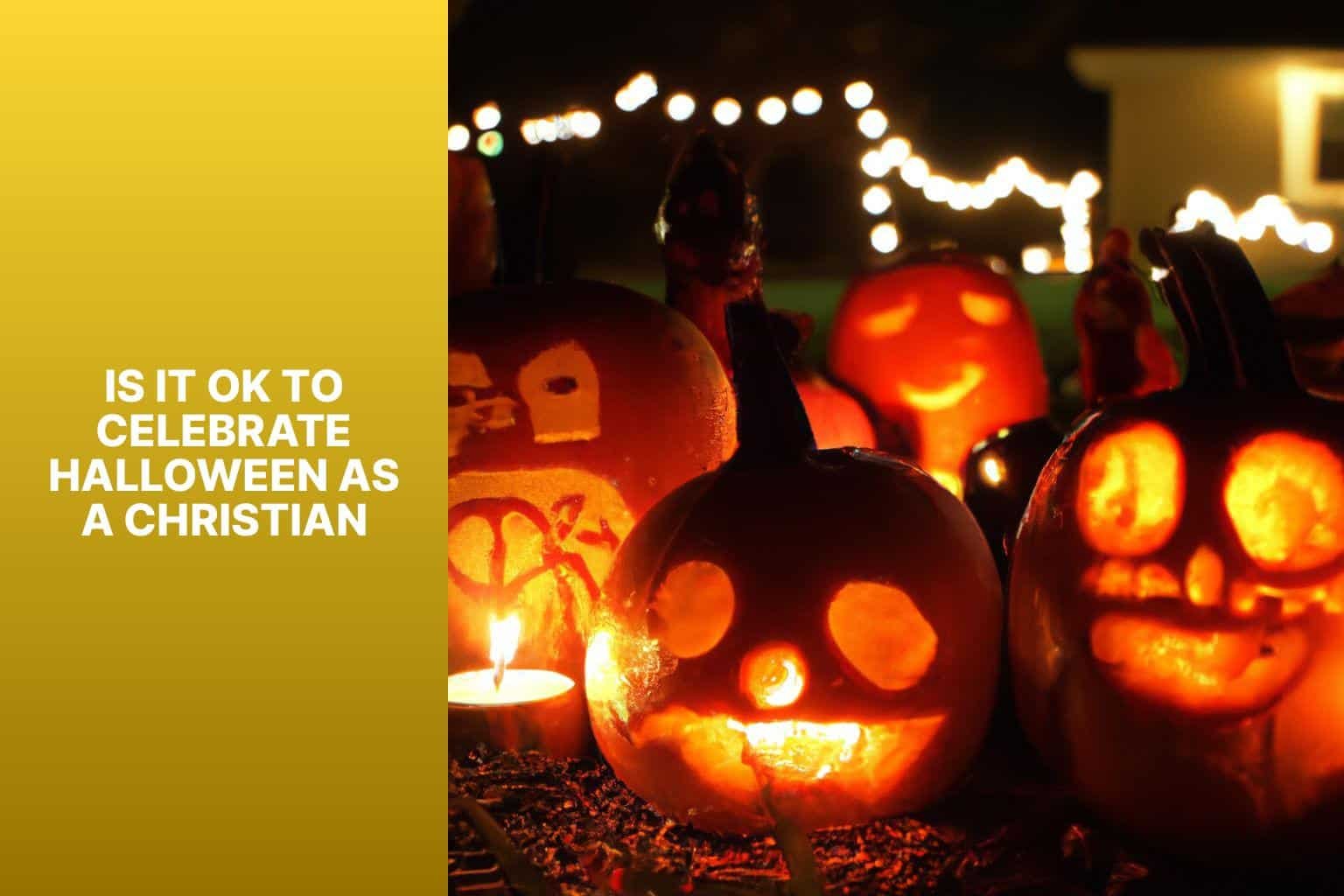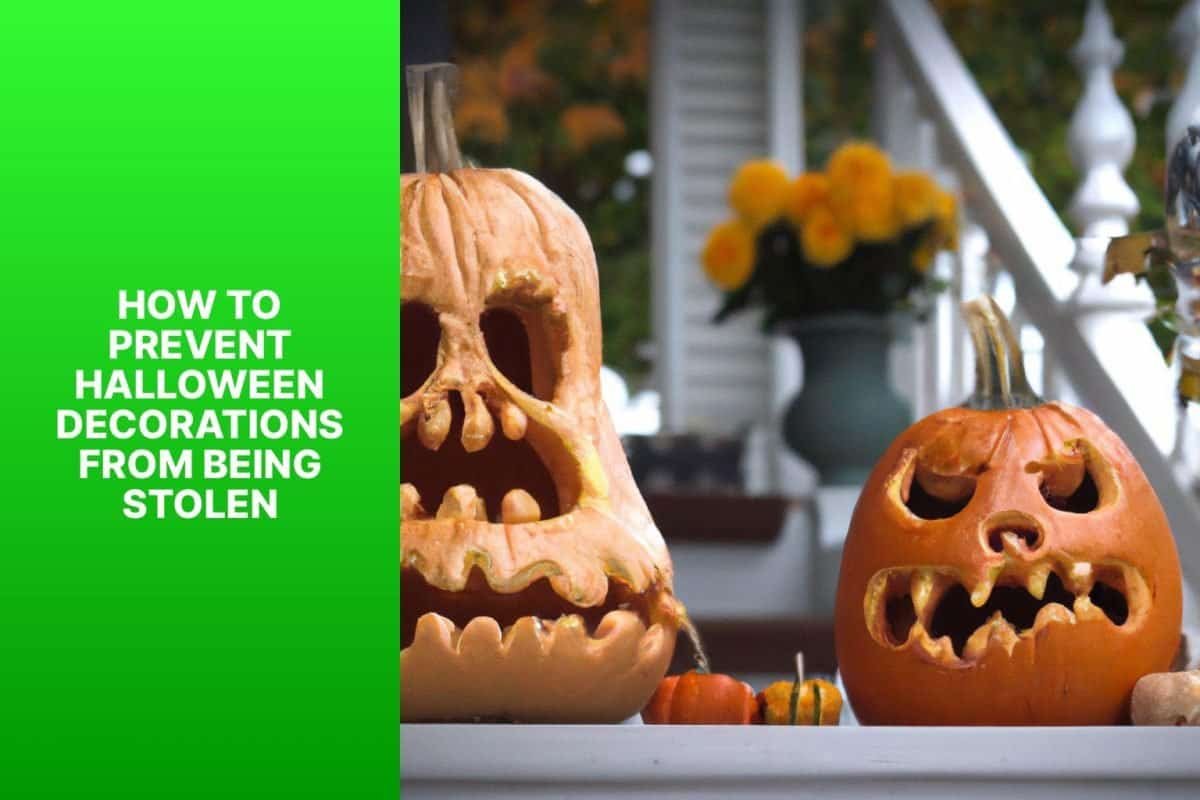The celebration of Halloween has been a subject of debate among Christians, with varying perspectives on its compatibility with faith. To understand this topic, it is essential to examine the history and origins of Halloween. It traces back to the ancient Celtic festival known as Samhain, marking the end of the harvest season and the beginning of winter. Over time, Christian influence led to the establishment of All Saints’ Day on November 1st, which honored saints and martyrs. The eve of this holy day came to be known as All Hallows’ Eve, eventually becoming Halloween as we know it today.
The debate among Christians regarding the celebration of Halloween centers around conflicting arguments. Some argue in favor of embracing Halloween as an opportunity for community engagement, creativity, and harmless fun. On the other hand, some Christians hold reservations against Halloween, viewing it as rooted in pagan rituals and occultism.
When it comes to understanding the biblical perspective on Halloween, discernment and personal conviction play a pivotal role. Christians are encouraged to evaluate their participation based on biblical principles and their own relationship with God. It is also important to consider the influence of culture and the potential impact it can have on one’s faith.
For those who prefer alternative options, there are various ways for Christians to engage during this season. Hosting church events that offer family-friendly alternatives to traditional Halloween activities can provide a safe and inclusive space for celebration. Focusing on other holidays that align more closely with Christian beliefs, such as Thanksgiving or Christmas, can also be a viable alternative. promoting acts of service and kindness within the community can be a meaningful way to make a positive impact during the Halloween season.
Ultimately, the decision to celebrate Halloween as a Christian is a matter of personal conviction and discernment guided by biblical principles. Understanding the history, examining different perspectives, and seeking God’s guidance can help Christians navigate this discussion with grace and wisdom.
Key takeaway:
- Celebrating Halloween as a Christian is a personal decision: Christians have different perspectives on Halloween, and the choice to celebrate or not depends on personal discernment and conviction.
- Halloween has historical and cultural origins: Understanding the history of Halloween, including its ancient Celtic roots and Christian influence, can inform a Christian’s viewpoint on participation.
- Alternative options for Christian participation: Rather than celebrating Halloween, Christians can consider hosting church events, focusing on other holidays, or promoting acts of service and kindness as alternative ways to engage with the community.
The History and Origins of Halloween
Discover the fascinating origins and rich history of Halloween in this section. We’ll delve into the ancient Celtic festival of Samhain, a precursor to our modern-day Halloween festivities. We’ll explore the Christian influence on Halloween through the introduction of All Saints’ Day. Get ready to dive into the captivating tales and traditions that have shaped this spooktacular holiday!
Ancient Celtic Festival: Samhain
Samhain, an ancient Celtic festival, holds historical significance as it marks the end of the harvest season and the beginning of winter. Celebrated over 2,000 years ago in Ireland, Scotland, and Europe, this ancient Celtic festival blurred the boundary between the living and spirit worlds. Bonfires, costumes, and offerings to ancestors were all part of the traditions of Samhain.
It is interesting to note that Samhain played a pivotal role in shaping Halloween as we know it today. Christian holidays incorporated many of the pagan traditions associated with this ancient Celtic festival in order to convert the Celtic people. In fact, All Saints’ Day, also known as All Hallows’ Day, was established on November 1st, intentionally coinciding with the celebration of Samhain. As a result, the night before, October 31st, became known as Halloween.
Understanding the historical roots of Halloween and the practices associated with Samhain is crucial for Christians who are considering whether or not to celebrate this holiday. It is important to carefully evaluate personal convictions and ensure that cultural influences haven’t overshadowed one’s Christian faith. Ultimately, the decision to celebrate Halloween as a Christian requires thoughtful consideration.
Christian Influence: All Saints’ Day
The Christian influence on Halloween is evident through the celebration of All Saints’ Day. All Saints’ Day, also known as All Hallows’ Day, is observed on November 1st, the day after Halloween. It is a Christian holiday to honor and remember all saints, including those not officially recognized by the church.
On All Saints’ Day, Christians gather in churches to offer prayers and pay homage to the saints. They reflect on the lives of these holy individuals and seek their intercession. The celebrations may include special church services, processions, and lighting candles on loved ones’ graves.
The Christian influence on Halloween can be traced back to the early church’s effort to Christianize pagan festivals. By establishing All Saints’ Day, the church provided an alternative for believers to honor their ancestors and departed loved ones in a Christian context.
Many Christians today view Halloween as a chance to celebrate the victory of light over darkness and remember the spiritual legacy of the saints. Opinions on celebrating Halloween vary among Christians. Some fully embrace the holiday, while others choose alternative options for Christian participation.
The Debate Among Christians
Unveiling the arguments both in favor of and against celebrating Halloween, this intriguing section offers a fresh perspective on this widely discussed topic. Delve into the contrasting viewpoints and discover the various factors that shape the opinions within the Christian community. From the significance of cultural traditions to religious concerns, join the conversation and explore the multifaceted debate surrounding the celebration of Halloween as a Christian.
Arguments in Favor of Celebrating Halloween
Community Engagement: Celebrating Halloween allows Christians to engage with their community, which is one of the arguments in favor of celebrating Halloween. By participating in trick-or-treating or local events, Christians can build relationships with neighbors and be actively involved in their neighborhood.
Teaching Moments: Halloween can be a valuable teaching moment for Christians to share biblical values, as another argument in favor of celebrating Halloween. Christians can use costumes to portray characters that reflect their faith and start conversations about God’s love, redemption, or biblical principles, fostering meaningful discussions and spreading the message of Christianity.
Redeeming a Secular Holiday: Some argue that celebrating Halloween can infuse a secular holiday with Christian values, representing yet another argument in favor of this celebration. By emphasizing themes of light overcoming darkness and good triumphing over evil, Christians can share their faith and demonstrate how their beliefs align with the holiday, serving as a positive influence in their communities.
Family Bonding: Celebrating Halloween together can be a time of fun and bonding for families, which is an important argument in favor of this celebration. Activities like pumpkin carving, decorating the house, or attending church-sponsored events can create lasting memories and strengthen family relationships, providing an opportunity for families to spend quality time together.
Cultural Engagement: Halloween is deeply ingrained in Western culture, making it an ideal occasion for Christians to engage with and understand cultural practices and traditions. By participating in Halloween, Christians can demonstrate an interest in their community’s customs, fostering empathy and bridge-building between Christians and non-Christians.
Creative Outreach Opportunities: Halloween provides unique opportunities for Christians to be creative in their outreach efforts, further supporting the argument in favor of celebrating this holiday. Alternative events like trunk-or-treats, fall festivals, or Halloween-themed church services can attract non-Christians who may not feel comfortable attending regular church gatherings, allowing them to explore their faith in a more relaxed and inviting environment.
Arguments Against Celebrating Halloween
Contradiction with Christian beliefs: Some Christians argue against celebrating Halloween because it contradicts their religious beliefs. They believe Halloween has pagan origins and is associated with witchcraft and occult practices, which go against teachings in the Bible.
Focus on darkness and evil: Another argument against celebrating Halloween is that it promotes and glorifies darkness and evil. Some Christians believe that Halloween decorations, costumes, and activities like haunted houses and scary movies can negatively influence individuals, especially children.
Idolatry and worship of the dead: Halloween is often associated with honoring and remembering the dead, which some Christians see as idolatrous and a form of necromancy. They believe that as Christians, they should not participate in activities involving consulting or venerating spirits of the departed.
Alternative options for Christian participation: Instead of celebrating Halloween, some Christians choose to focus on other holidays that align more closely with their beliefs. They may participate in events like Fall Festivals or Harvest Celebrations that emphasize biblical themes and values.
Emphasis on promoting acts of service and kindness: Rather than participating in Halloween festivities, some Christians advocate for redirecting their energy towards promoting acts of service and kindness in their communities. They may organize events that focus on helping those in need or spreading positivity and love.
Considering the arguments against celebrating Halloween: Christians should carefully evaluate their personal convictions, biblical teachings, and the influence of culture before deciding whether or not to partake in Halloween celebrations. Each individual should prayerfully discern what aligns with their faith and strive to honor God in their choices.
Biblical Perspectives on Halloween Celebration
In this section, we’ll dive into the biblical perspectives on Halloween celebration, exploring the importance of discernment and personal conviction. We’ll also examine how culture influences our views on this topic. Get ready to uncover intriguing insights and discover how to navigate this controversial subject as a Christian. Let’s separate fact from fiction and delve into the deep-rooted beliefs surrounding Halloween within a biblical context.
Discernment and Personal Conviction
Discernment and personal conviction play a crucial role when Christians contemplate whether it is acceptable to partake in Halloween festivities. It is imperative for each individual to reflect on their own beliefs and values. They must carefully assess how their involvement in Halloween aligns with their faith and whether it upholds Christian principles.
Practicing discernment entails seeking divine guidance and relying on personal conviction when making decisions. Christians should evaluate whether celebrating Halloween contradicts biblical teachings or compromises their faith. While some Christians may perceive Halloween as innocent amusement and an opportunity to engage with their community, others may view it as promoting values and activities that conflict with their beliefs.
In this matter, Christians should embrace different perspectives without passing judgment or imposing their convictions on others. Instead, they should engage in open and respectful conversations, fostering understanding and unity within the community. By employing discernment and personal conviction, Christians can make intentional choices that align with their faith and values.
It is interesting to note that approximately 58% of American Christians believe celebrating Halloween is acceptable, while 23% consider it inappropriate. This statistic exemplifies the wide range of opinions within the Christian community regarding Halloween celebrations.
The Influence of Culture
The influence of culture shapes our beliefs, practices, and traditions, including our views on Halloween as Christians. Culture includes societal norms, values, and customs that can endorse or challenge Halloween. Some Christians view Halloween as a cultural event, while others see it conflicting with their faith.
Culture influences how Christians interpret and engage with Halloween. For some, Halloween is an opportunity to connect with neighbors and show hospitality. They believe it can build relationships and share the love of Christ.
Some Christians are concerned about the pagan origins and association with witchcraft in Halloween. They choose not to participate to maintain spiritual purity and prioritize their faith in Christ.
Ultimately, whether Christians participate in Halloween is a personal conviction influenced by culture. Each believer should prayerfully consider their stance based on biblical teachings, guidance from the Holy Spirit, and obedience to God.
Alternative Options for Christian Participation

Photo Credits: Rickyshalloween.Com by Steven Hernandez
Looking for alternative options to celebrate Halloween as a Christian? Look no further! In this section, we’ll explore some exciting ways you can participate in this holiday without compromising your faith. From hosting church events to focusing on other holidays, and promoting acts of service and kindness, there are plenty of creative avenues to infuse the Halloween spirit with your Christian values. Get ready to discover new ways to embrace the season while staying true to your beliefs!
Hosting Church Events
Organizing a Halloween alternative event at your church can provide a safe and fun environment for families. Consider hosting a fall festival with games, bounce houses, and costume contests. Hold a trunk-or-treat event in the church parking lot, where volunteers decorate their car trunks and hand out candy. Invite community members to a harvest-themed potluck dinner or a movie night with a Christian-themed film. Encourage attendees to dress up as Bible characters or heroes of faith.
Hosting church events during Halloween strengthens the sense of community and provides an enjoyable alternative for families.
Focusing on Other Holidays
When it comes to deciding whether or not to celebrate Halloween as a Christian, it is a good choice to focus on other holidays. By directing our attention and participation towards these alternative holidays, we can still engage in meaningful celebrations without compromising our beliefs or values.
One holiday that can take priority over Halloween is Christmas. Emphasizing the birth of Jesus Christ during this time provides us with opportunities for worship, reflection, and acts of charity and love.
Another holiday that can be a focal point for Christians is Easter. We can celebrate Christ’s resurrection and the hope it brings through church services, fellowship, and acts of service to the community.
Thanksgiving is also a great option for Christians. It is a holiday centered around gratitude and giving thanks to God. We can reflect on our blessings, share a meal with loved ones, and reach out to those in need.
Observing religious holidays like Good Friday, Pentecost, or Ascension Day can also deepen our faith and prioritize spiritual growth. These occasions offer opportunities for worship, fellowship, and reflection.
By focusing on these other holidays, Christians can ensure that their celebrations align with their beliefs and values. These alternative options provide meaningful ways for us to honor God, engage in fellowship, and express gratitude without participating in Halloween festivities.
Promoting Acts of Service and Kindness
Promoting acts of service and kindness is a meaningful way for Christians to participate in alternative options during Halloween. Suggestions include:
- Organize community service events for church members to serve those in need, such as volunteering at a local soup kitchen, organizing clothing drives, or visiting elderly care facilities to provide companionship.
- Create care packages for the homeless or less fortunate, filled with essential items like food, hygiene products, and warm clothing. Distribute them to those in need in the community or partner with a local charity for proper distribution.
- Offer practical assistance within your church or neighborhood, such as helping with maintenance or repair projects, organizing events for children or seniors, or providing childcare for parents in need of a break.
- Reach out to the lonely and isolated, inviting them for a meal, engaging in conversation, or simply offering a listening ear. Small acts of kindness can greatly brighten someone’s day.
- Participate in fundraising initiatives for causes you are passionate about, such as organizing charity walks or runs, hosting bake sales, or starting online campaigns to raise funds for specific needs or organizations.
- Show kindness to strangers through random acts of kindness, like paying for someone’s meal or coffee, helping them carry their groceries, or offering assistance to those in need.
Engaging in acts of service and kindness allows Christians to positively impact their communities, aligning with the principles of love and compassion taught in the Bible. By choosing to focus on promoting acts of service and kindness during Halloween, Christians can demonstrate their faith in action and make a difference in the lives of those around them.
Frequently Asked Questions
Is it okay to celebrate Halloween as a Christian?
There is controversy among Christians regarding the celebration of Halloween. Some see it as harmless, while others view it as a promotion of darkness and wickedness due to its pagan origins. Ultimately, the decision is personal and should be made for the glory of God.
What does the Bible say about celebrating Halloween?
The Bible does not mention Halloween specifically. It does provide principles for approaching celebrations that involve witchcraft, sacrifice, and worldly behaviors. Christians are called to live in the light, walking in faithful obedience to God.
Can Christians participate in Halloween activities?
Christian responses to Halloween vary. Some reject it entirely, while others accept or redeem the holiday. Elements like dressing up in innocuous costumes and trick-or-treating can be seen as harmless and fun. Caution should be exercised in avoiding any participation that promotes darkness or glorifies evil.
How can Christians approach Halloween in a godly manner?
Christians who choose to participate in Halloween can do so in a godly environment, such as attending harvest festivals held by churches. Some distribute Gospel tracts along with candy, using the occasion as a conversation starter to share their faith. It is important for their behavior and interactions to reflect their redeemed life in Christ.
Should Christians avoid haunted churches or use magic paraphernalia on Halloween?
As Christians, it is advisable to avoid participating in activities that may involve haunted churches or the use of magic paraphernalia. The Old Testament condemns witchcraft, and the New Testament emphasizes the incompatibility of occultism and Christianity. Christians should seek God’s wisdom and discernment in making decisions during Halloween and any other time.
How can Halloween be an opportunity for Christians to share their faith?
Halloween can serve as a reminder to Christians that people are searching for answers, often seeking supernatural works. Christians can use this occasion to help guide others to the true source of power – God. By loving, listening, and respecting those they may not agree with, Christians can demonstrate their faith and pray for opportunities to reach both unbelievers and fellow believers.









![[Jesus is Light] Fall Festival | Halloween Stickers (96 pk)](https://m.media-amazon.com/images/I/61x4abLSB8L._SL500_.jpg)






